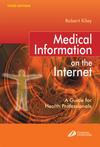医疗信息与因特网
2003-5
Elsevier Science Health Science div
Kiley, Robert
185
A New Edition of a successful and highly praised guide to using the Internet, aimed at health professional of all kinds. New and revised edition of a highly praised guide to the internet for health professionals, which is useful both to beginners and to established users wanting tips and guidance on specifically medical internet resources. Clear and practical guidance on getting started and finding what you want. Concise but comprehensive coverage of those areas of the internet of most interest to medics - medical databases, search engines and directories, interactive learning resources, medical portals and the quality of information issue. Consumer health chapter helps the health professional direct patients to authoritative sources of information on the Internet Supporting Web pages at http://www.medinfolinks.com , regularly updated by the author, give links to all the sites mentioned in the book, details of useful new sites which have appeared since publication, updates on URLs which have changed, a sample chapter and a "contact the author" facility. New section on medical databases will help readers search databases such as Cochrane and MEDLINE effectively. Discussion of medical-specific search engines. New chapters on medical journals, online images and physician-only portals. Focus on new connectivity options available to the home user. All other chapters extensively revised and rewritten.
Preface to the third editionAcknowledgementsSECTION 1:Connecting,browsing and communicating 1. Why use the Internet Introduction The Internet for health professionals Using this book Section 1: Connecting, browsing and communicating Section 2: Medical databases on the Web Section 3: Searching the Web Section 4: The medical Web Accessing Internet resources Conclusion References 2. Getting connected: new choices Introduction Access routes Dial-up: pay-as-you-go access Dial up: unmetered access Broadband: ADSL access Broadband: cable access Broadband: satellite access Access routes: the bottom line Protecting your computer and files Computer hackers Viruses Conclusion References 3. Effective Web browsing Introduction Web browsing: the basics Bookmarks and Favorites Saving Web pages Web browsing: advanced features Filtering content Privacy and security Web accessibility Specialised browsers Screen readers and voice-activated browsers Conclusion Reference 4. Communicating Introduction E-mail: The Basics Why use it? E-mail for heajth professionals E-mail clients Secure e-mail: Encryption and digital signatures Encryption Digital signatures E-mail: other features E-mail to fax Free e-mail accounts Finding e-mail addresses Discussion lists and newsgroups Discussion lists Finding relevant lists Joining, contributing to and leaving a discussion list Usenet news - newsgroups Accessing newsgroup postings Arrangement of newsgroups Finding relevant newsgroups Filtering the news Conclusion ReferencesSECTION 2:Medical databases on the WedSECTION 3:Searching the WebSECTION 4:The medical WebIndex
